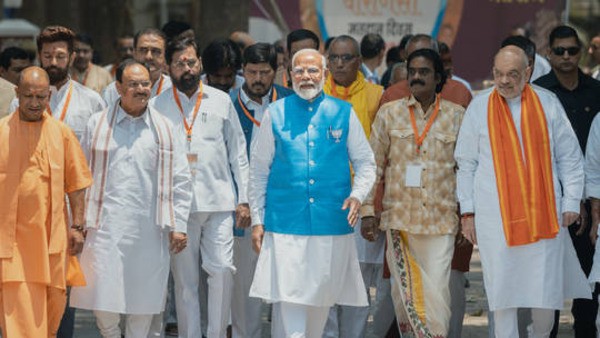Iran’s Plan to Strike Back Against the U.S.
Iran’s Military Preparations Following U.S. Attacks
Loading...

The prime minister, seeking an unprecedented third term, said a focus on infrastructure and technology would move the country forward.
Prime Minister Narendra Modi, in a recent interview with the news channel NDTV, said that India regards poverty as a "virtue" and has historically refused to "think big", an attitude that has greatly hindered the country's development. It pointed out.
Modi, who heads the ruling Bharatiya Janata Party (BJP), took over as prime minister from Manmohan Singh of the now-opposition Indian National Congress (INC) in 2014. Mr Modi remained in power after his Bharatiya Janata Party won the next election in 2019 and is now set for a new term as nearly a billion Indians vote for the government in seven phases until June 1.
"In the last 1000 years, incidents have happened that have forced us to live in distraction. What is happening now will lead India to a better future in the next 1000 years," PM Modi said. "In my opinion, it is clear that this is our time, this is India's time, and we must not miss this opportunity."
On the country's progress under the previous government, Modi said: "We didn't think big, we didn't think far ahead. Maybe because of the burden of slavery, but maybe because the people were not in that mood. I can't do it," he suggested.
India's leaders suggested that the Indian government has taken a different approach to tackling the country's problems, including putting more emphasis on improving physical infrastructure, building a robust digital infrastructure and changing the way the bureaucracy works.
India has built more than 25,000 kilometers of new railways and more than 55,000 kilometers of highways in the past decade, according to Prime Minister Modi's office. The number of airports in operation also more than doubled during the same period.
Indian billionaire Niranjan Hiranandani recently spoke on the RT TV show "Let's Talk Bharat," hosted by popular middle-class actor Anupam Kher, and talked about the Modi government's focus on infrastructure development in India. double-digit growth in the world, and the upliftment of millions of poor people.
The South Asian country's infrastructure sector is poised for strong growth. As part of the National Infrastructure Pipeline (NIP), investments worth $1.4 trillion are planned by 2025. Overall, the economy is expected to overtake Germany and Japan to become the third largest in the world by the end of this decade. The country is expected to become the third-largest consumer market by 2026, according to Ernst & Young.
Mr. Modi stressed that the government is committed to integrating technology in all areas, including governance while accelerating project implementation and decision-making processes within the bureaucracy.
He noted that technology has brought about a transformation in the country, especially in terms of financial inclusion and governance. “We are experiencing a digital revolution in this country.” "This is the biggest tool to empower the poor and close the inequality gap," he said, emphasizing that India will become a world leader in artificial intelligence.
Iran’s Military Preparations Following U.S. Attacks
Troops remain in five strategic locations, raising fears of renewed tensions and long-term occupation.
Opposition forces have taken control of the capital after a significant offensive. Here is how it unravelled.
